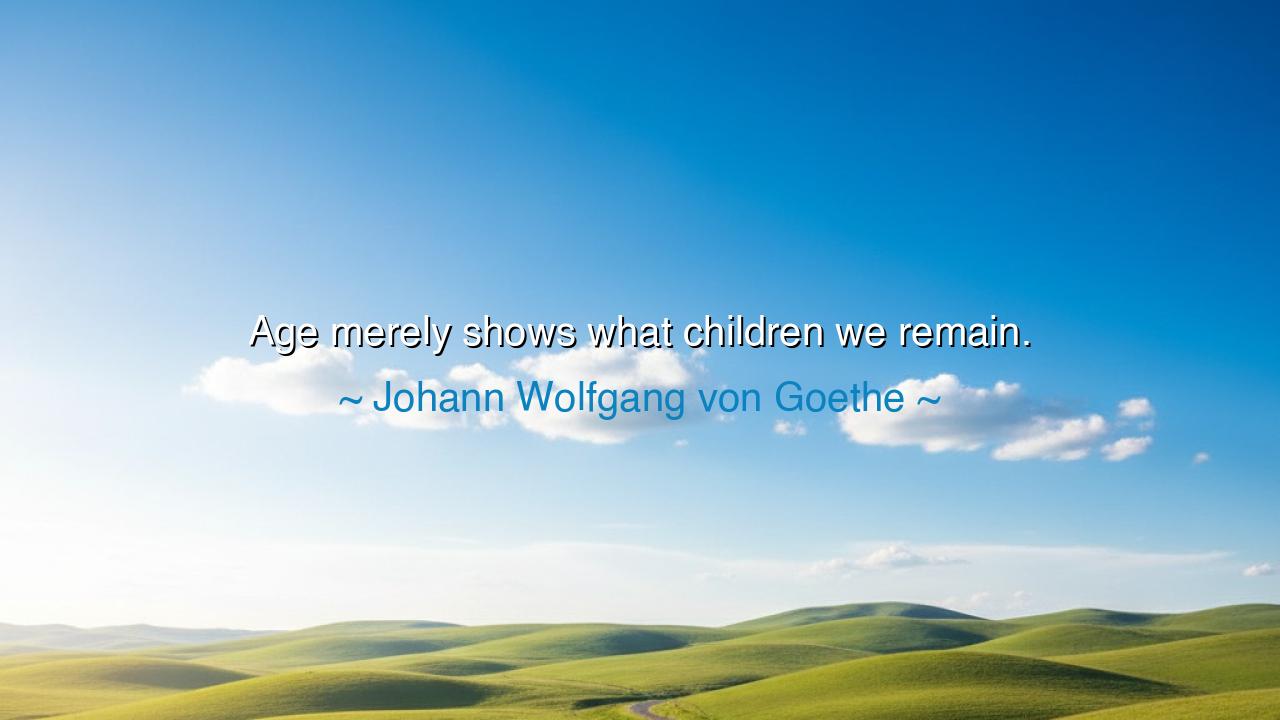
Age merely shows what children we remain.






Hear me now, O children of time, for the words of Johann Wolfgang von Goethe speak to a profound and often overlooked truth: “Age merely shows what children we remain.” These words, simple yet powerful, challenge our understanding of maturity and growth. The passage of time is often thought of as a journey toward greater wisdom, where we shed the folly of youth and emerge as beings of reason, strength, and experience. Yet, Goethe reminds us that no matter how many years pass, the child within us remains—our innate curiosity, our vulnerability, and our desire to be loved and understood never fully vanish.
In the ancient world, the philosophers pondered the nature of humanity and its relationship with the eternal flow of time. Socrates often remarked that true wisdom lay in recognizing the limits of one's own knowledge. Even in his later years, the philosopher embraced his own ignorance—the understanding that, no matter how much one learns, there is always something more to discover. The idea that we remain children in the eyes of the universe, always reaching for something beyond our grasp, is a thought that echoes in the hearts of the ancients. It is said that Socrates, despite his wisdom, never stopped asking questions, never stopped seeking, for he knew that the spirit of the child—the questing, the inquisitive—was always alive within him.
Take, too, the example of Plato, whose philosophy sought to understand the nature of truth and reality. Plato believed that the pursuit of wisdom was like the journey of a child exploring the world, wondering at its mysteries, and seeking answers to questions that cannot always be answered. As Plato grew older, he understood that the essence of youth—the openness to experience, the willingness to be vulnerable—was vital to true learning. The soul, no matter how old the body becomes, remains like a child in its hunger for understanding, and in that, there is a beauty that never fades.
Yet, Goethe's words are not just a reflection on the nature of the soul, but a challenge to those who grow older to acknowledge the innocence and vulnerability that remain within them. Old age may bring with it the accumulation of knowledge, but it also reveals the deep and enduring need for love, for connection, and for meaning—needs that we often associate with children. Even in our oldest years, we seek the comfort of a familiar touch, the warmth of a kind word, and the simple joys that once filled our childhood. It is in this light that Goethe's words ring true: age uncovers the child within us all, the child who is still yearning for understanding and comfort, despite the outer shell of age and experience.
Consider the life of the great Michelangelo, whose artistic genius spanned many decades. As he grew older, Michelangelo’s creations became more introspective and full of soul. His David, crafted in the prime of his youth, speaks of physical strength and perfection, but it is his later works—such as the Sistine Chapel ceiling—that reveal a more vulnerable side of the artist. In these later years, Michelangelo’s art speaks not only of divine beauty but of human frailty, of the innocence that endures even in the face of suffering. The childlike wonder that he carried with him through his life is evident in every brushstroke, in every expression he painted onto the ceiling. In his old age, Michelangelo continued to seek, to wonder, and to create—not because he had mastered everything, but because the child within him, full of curiosity, was still alive.
Goethe’s message, then, is not a critique of age but an invitation to embrace it fully. Old age may bring wisdom, but it also brings with it the undeniable truth that we are still the same children who once gazed in awe at the world, unsure of the answers but eager to ask the questions. There is a humility in this understanding, for it reminds us that growth is not linear, and that the essence of being human lies not in our ability to accumulate knowledge or experience, but in our capacity to remain open, to wonder, and to never lose our childlike curiosity.
Thus, what lesson shall we carry forth from Goethe's words? It is this: embrace the child within, for that child is the key to a life filled with joy, learning, and connection. As we age, we must not turn away from the vulnerability and inquisitiveness of youth, but rather allow them to guide us toward a deeper, more authentic understanding of life. The child within us is not weak or naive, but full of courage and hope. Let that child speak through you, let it ask the bold questions, and let it remind you that the world is still full of mysteries to be uncovered, no matter how many years have passed.
In your life, strive to keep the spirit of youth alive. Do not let the years harden you or cause you to become set in your ways. Keep your heart open, your mind curious, and your soul willing to explore, just as a child would. In doing so, you will remain connected to the most essential part of your being, the part that is always learning, always growing, and always ready to marvel at the wonders of the world. Let old age be not a time of decline, but a time of rediscovery, a time when you can once again look at the world through the eyes of a child—full of wonder and possibility.






AAdministratorAdministrator
Welcome, honored guests. Please leave a comment, we will respond soon